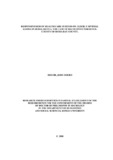| dc.description.abstract | Optimal aging in the elderly has become an important concept globally due to increasing number of people aged 60 years and above and their subsequent pressure on health services. The elderly, expectant mothers and children below five years comprise the world vulnerable population. In Kenya, unlike the Western world, only the expectant mothers and children below 5 years have special health care service guides, thus leaving the elderly on routine health care system. This study investigated the influence of health systems responsiveness on optimal ageing of the elderly in rural Kenya, Rachuonyo north sub-county of Homa Bay county. Specifically, the study sought to determine the level of optimal aging among the elderly, establish the influence of respect for persons in caring for the elderly on elderly optimal ageing, determine the influence of implementation of the concept of client orientation in caring for the elderly on elderly optimal ageing, evaluate the influence of Health System preparedness to care for the elderly on elderly optimal ageing. The study was guided by Systems theory. A conceptual framework showing the relationship between health system responsiveness and optimal aging was adopted. The study employed a descriptive cross-sectional explorative survey. Semi-structured questionnaires, interviews and focus group discussions were used as methods of data collection. Study population was 10,033 elderly and sample size of 385 was determined by Taro Yamane’s formula with margin of error of 5%. Respondents were obtained by using cluster and purposive sampling methods. Further 45 Key Informants and five 10 focus group discussion members were obtained by purposive sampling method. Reliability of the questionnaire was determined by Cronbach alpha which ascertained at least 0.7 in all subscales. Validity was determined by expert supervisors and by piloting. Quantitative data was analyzed using mean, correlation and regression while qualitative data was analyzed thematically in which concepts were identified and emerging themes generated. In a Likert scale of 1to 5, the study established that there was moderate level of optimal ageing with mean response of2.61, (r =.247; p < 0.05), there was positive correlation (r =.247;p < 0.05) between observance of respect for persons and elderly optimal ageing, there was positive correlation (r =.534; p< 0.05) between implementation of the concept of client orientation and optimal ageing and there was positive correlation (r =.447; p < 0.05)between health system preparedness and elderly optimal ageing. The study revealed that health system accounts for 56% of the variances in optimal aging of the elderly in the study area. In conclusion, the study established that elderly experience moderate aging due to multiple morbidity associated factors; there was statistically significant influence of implementation of client orientation in caring for the elderly on elderly optimal ageing however, majority of the elderly expressed marked resentments over respect accorded to them by health staff; there was statistically significant influence of implementation of the concept of client orientation in caring for the elderly on optimal ageing but there was inadequate understanding of the elderly on the potentials and challenges of the health systems. Finally, there was statistically significant positive effect of Health Systems preparedness on elderly optimal ageing and that currently health service providers practice with general health care knowledge. The study recommended the use of specific elderly care service guide, sensitization of health care service provider to the observance of respect for persons, positive interactive sessions between health care service provider and the elderly, specialized training of health care service providers to care for the elderly and further study on how to improve on the observance of respect for persons in caring for the elderly. | en_US |

